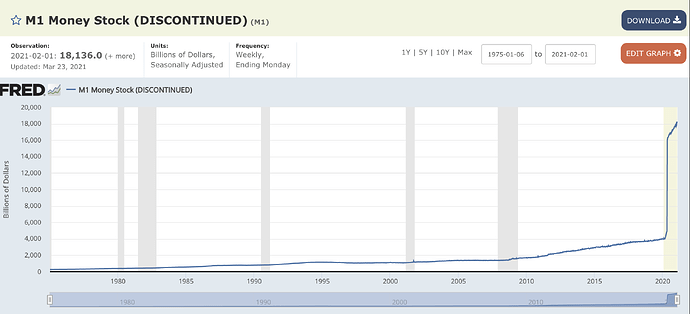Interesting article from FT on the UK this week which points in the direction of higher inflation. Key points in bold. I assume similar applies in CH i.e. people with salaries accumulated a lot of savings
I saw another headline that Barclays Bank are predicting the UK economy will grow at its fastest rate since 1948 due to the accumulated savings that people are itching to spend and vaccine programme
https://www.google.ch/amp/s/amp.ft.com/content/e651bff7-8211-4aa6-9b22-4ac968fe6675
"UK household wealth has risen to record levels during the coronavirus pandemic on the back of rising house prices, increased value of defined benefit pensions and government support, official figures showed on Thursday.
Households’ net wealth rose to £11.4tn, the equivalent of £172,000 per person in the UK. The Office for National Statistics said this resulted from a rise in house prices of 8.5 per cent in the year to December 2020, improved pension wealth and higher savings, as richer and older people were shielded from the financial effects of Covid-19 by the government, which saw its balance sheet slip further into the red.
The UK government’s liabilities have exceeded its assets since 2008 with the negative net worth of both local and central government estimated by the ONS to have deteriorated by £350bn last year to stand at minus £1.35tn.
The rise in housing wealth at a time of increasing public sector indebtedness will fuel questions about the intergenerational fairness of the UK’s economy.
Ashley Seager, co-founder of the Intergenerational Foundation, a campaign group promoting the interests of younger and future generations, said the figures demonstrated two issues that were being placed on younger people.
“The first comprises the housing wealth transfer from younger borrowers to older homeowners. The second is the mountain of government debt, which has ballooned thanks to Covid-19, that will be passed on to younger generations to bear along with lower standards of living, more precarious employment and far lower pensions in old age,” he said.
The ONS figures showed that the household balance sheet improved by £950bn to reach the total net worth of £11.4tn — a figure that is more than four times as high as in 1995, when the balance sheets were first published, while the cash size of the economy rose only 2.5 times.
Of the increase in net worth, households gained from large increases in the value of the housing stock, increased value of final salary pensions and higher cash savings as people spent less than their incomes.
Torsten Bell, director of the Resolution Foundation think-tank, said: “The nature of the Covid-19 crisis has meant households had their balance sheets protected while the government balance sheet took a pasting.
“Homeowners and the rich did well, while younger people will be left having to take decisions in future about how to deal with higher public and private debts,” he added.
Kate Barker, a housing expert and former member of the Bank of England’s monetary policy committee, said: “I’d have much preferred to see household balance sheets improve because there were more houses than because house prices have risen”.
The UK government is rare among rich countries in having a negative net worth because it went further than most others in selling off assets over the past 40 years.
Its total non-financial assets stood at £842bn in 2020 with another £858bn in financial assets, but these figures were dwarfed by its total financial liabilities, mostly in the form of government debt, which amounted to £3tn at the end of 2020. "



